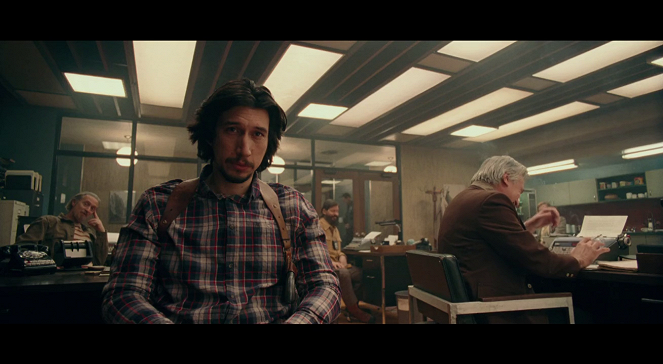Réalisation:
Spike LeePhotographie:
Chayse IrvinMusique:
Terence BlanchardActeurs·trices:
John David Washington, Adam Driver, Topher Grace, Laura Harrier, Jasper Pääkkönen, Michael Buscemi, Ryan Eggold, Paul Walter Hauser (plus)VOD (3)
Résumés(1)
Au début des années 70, au plus fort de la lutte pour les droits civiques, plusieurs émeutes raciales éclatent dans les grandes villes des États-Unis. Ron Stallworth (John David Washington) devient le premier officier Noir américain du Colorado Springs Police Department, mais son arrivée est accueillie avec scepticisme, voire avec une franche hostilité, par les agents les moins gradés du commissariat. Prenant son courage à deux mains, Stallworth va tenter de faire bouger les lignes et, peut-être, de laisser une trace dans l'histoire. Il se fixe alors une mission des plus périlleuses : infiltrer le Ku Klux Klan pour en dénoncer les exactions. En se faisant passer pour un extrémiste, Stallworth contacte le groupuscule : il ne tarde pas à se voir convier d'en intégrer la garde rapprochée. Il entretient même un rapport privilégié avec le "Grand Wizard" du Klan, David Duke (Topher Grace), enchanté par l'engagement de Ron en faveur d'une Amérique blanche. Tandis que l'enquête progresse et devient de plus en plus complexe, Flip Zimmerman (Adam Driver), collègue de Stallworth, se fait passer pour Ron lors des rendez-vous avec les membres du groupe suprémaciste et apprend ainsi qu'une opération meurtrière se prépare. Ensemble, Stallworth et Zimmerman font équipe pour neutraliser le Klan dont le véritable objectif est d'aseptiser son discours ultra-violent pour séduire ainsi le plus grand nombre. (Universal International FR)
(plus)Vidéo (8)
Critiques (15)
Un bon film, y compris au niveau de la conscience morale qu'il procure, avec des clins d'œil à la blaxploitation et des critiques sévères à l'encontre de Trump. Il aborde le racisme, le mouvement noir et le KKK, ce qui ne plaira pas à tout le monde. Mais il est intelligent, léger et bien ficelé, comme on pouvait s'y attendre avec Spike. Et grâce à ce film, John David Washington pourrait ensuite accéder à des rôles qui feraient de lui une nouvelle star noire avec les paramètres de Denzel Washington. P.S. Paul Walter Hauser (le petit gros « agent secret » de Moi, Tonya) se fond superbement dans son rôle ultrabourrin. [Cannes]
()
Spike Lee a choisi une histoire intéressante, absurde et invraisemblable, pour ensuite l’adapter avec brio en une remarquable comédie satirique. Il a par ailleurs perfectionné son choix avec une distribution extrêmement pertinente, ce qui permet une bonne alchimie entre les acteurs et le régal des spectateurs. Le tout est enrobé d’un style presque tarantinien. Et quand on se met à penser que le film qu’on regarde est excellent, on nous balance un épilogue totalement superflu – un genre de documentaire qui ne correspond pas à l’ambiance générale et donne l’impression que Spike Lee devait à tout prix exprimer ses positions noir sur blanc pour que même les faibles d’esprit comprennent. Heureusement, ce hic ne suffit pas à enrayer le sentiment globalement positif laissé par le film. Un film de qualité qui, sans l’ombre d’un doute, vaut la peine d'être vu. [KVIFF 2018]
()
Assez décevant dans l’ensemble. J’aime bien les films de Spike Lee et je m’attendais donc à ce que la barre soit placée très haut, comme d’habitude. Mais je me suis retrouvé avec un film plutôt moyen qui, visiblement, a fait plus dans le pathétique que dans le dramatique. J’en ressors avec un arrière-goût amer et l’impression que ce film rentre dans le quota des films noirs sélectionnés pour les Oscars.
()
Spike Lee, as an infinite supporter of black acting culture, has his movies often full of minority views, which go right over my European head. So I had to focus on his filmmaking qualities and there are undoubtedly plenty of them. In this movie he even brilliantly balanced white power and black power into one coherent story, which even though it seems absurd, actually really happened. And as I said, it might still be a reality in USA, but to me as a European it sounds unbelievable. Maybe this is the part of the film’s charm. To be honest, in the first 20 minutes he couldn’t resist to include some in my opinion unnecessary black scenes. But after a while you focus on young Washington and Adam Driver’s excellent performances which are in turn absurd, ironically funny but also thrilling and the movie ends with a good political chapter and a brief attack on Trump. Definitively a good movie and one of the most interesting ones on the topic of oppression of black population in the USA.
()
Previously it would have been a biographical drama or a heist film, but to express his political viewpoint this time, Spike Lee uses and reworks for his own needs the conventions of cop films about dual identity. The obstacles that the heroes have to overcome in accomplishing their mission come not only from the outside, but also in the form of their colleagues and superiors, who are unable to let go of their own prejudices and represent a system that disadvantages a certain part of the population. The pairing of two disparate characters serves for more than just creating comical situations that bring levity to a serious topic. It is also a condition for the implementation of Stallworth’s bold plan and, at the same time, expression of the film’s central conviction that the path to success is conditioned by cooperation, the struggle for shared values (though each one is completely different, they appear before the KKK members as one person), which can also be understood as a disputation with blaxploitation films, whose style BlacKkKlansman imitates. ___ The two protagonists start to think more about their respective identities following confrontations with white nationalists, who see them, as a black and a Jew, as a threat comparable to the plague and cholera. For example, in reply to the question of whether he is a Jew, Zimmerman initially answers “I don't know”. He later admits that, because of assimilation, he had never thought about his Jewishness, but he is now beginning to reconsider his position. Like his partner, he stops taking his infiltration of the Ku Klux Klan as nothing more than a job, as it becomes a personal matter for him. While Stallworth stops running away from the fact that he is black, Flip begins to proudly defend his Jewishness “thanks” to a group of anti-Semitic imbeciles. ___ Racists legitimise their words and actions by creating artificial enemies and spreading fear of a race war or the Jewish-Bolshevik conspiracy. Their vocabulary plays a fundamental role in this, though it does not have any sort of richness and displays an elementary ignorance of grammar, but it is also expressive enough to elicit strong emotions and attract unthinking crowds. Emotions replace the ability to work with facts and to argue more thoughtfully. One of the bigots reveals the absence of elementary logic in his attitudes when Flip warns him that it is nonsensical to deny the Holocaust, during which several million Jews were murdered and was thus the most amazing event in history from a white Nazi’s perspective. Within the KKK, relationships are established exclusively on the basis of shared hatred. Joining the organisation is conditioned by knowledge of the hate code (various terms of abuse for anyone who is not a white heterosexual American). However, it is necessary to make the language of this closed group widely known, for example with the aid of Hollywood epics such as The Birth of a Nation. ___ The wave of racially motivated violence in the 1970s was a backlash to some of the minor victories achieved by African-Americans in the previous decade. Similarly, the strengthening position of the extreme right in America today, stoked by the statements of the sociopath whom Spike Lee calls the “Orange motherfucker” and “Agent Orange”, can be seen as “retaliation” for the eight years of the Barack Obama administration. Lee’s film is permeated by parallels with current events in the United States and Europe. Even without the shocking postscript, it would be clear that, as in his earlier films, Lee used a historical theme to draw attention to the persistent intolerance of certain social groups. Though the style changes, the essence remains and the world will continue to need many heroes like Ron Stallworth and Heather Heyer. BlacKkKlansman says as much, perhaps without much nuance, but urgently enough to open the eyes of at least a few people who do not yet have totally whitewashed brains. 90%
()
(moins)
(plus)



Annonces